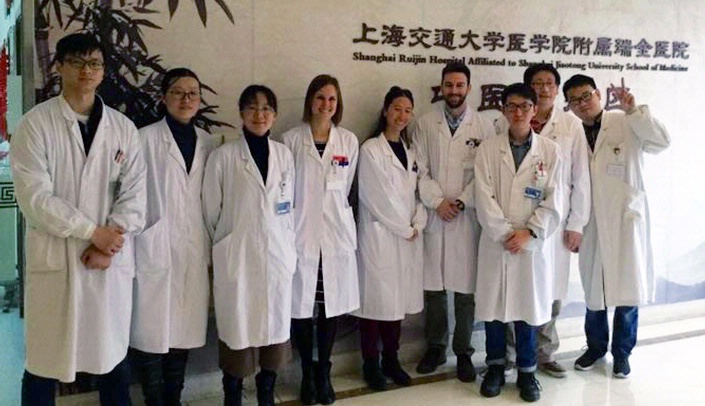Sally Ingham, Roxanne Haslam, and John Mitchell just finished rotations at Ruijin Hospital in Shanghai, China. Ruijin Hospital is affiliated with Shanghai Jiao Tong University School of Medicine.
I had the opportunity to talk with Sally about her experience.
Why did you decide to go to China for a rotation?
I decided to go to China for a rotation because I thought this was an excellent opportunity to learn about international and Traditional Chinese medicine. We touch briefly on the topics of health care in other countries (especially in terms of the cost), but are never exposed to how their health care practices are different. I also was curious to see if the spectrum of diseases (as well as the most common diseases) seen in a country such as China differs from those we see in the US. We also have limited exposure to alternative medicines (which includes Traditional Chinese Medicine), and I thought that going to China and learning about TCM firsthand would be the best way to learn more about the theories of TCM, the herbs used, and the practice of acupuncture.
What departments did you visit? Which did you like the best or learn the most from?
I spent two weeks with the Traditional Chinese Medicine (TCM) department and one week with the Infectious Diseases Department. It is hard to say which I liked the best as the departments were quite different and I really enjoyed my time with both departments. When I was with the TCM department, one of the residents named Dr. Zhao Lin (Zhao is her family name, Lin is her given name), spent at least an hour with us every morning after rounds teaching us TCM basics. During these lessons we learned the theory behind TCM including yin and yang, the 5 elements of TCM (including how they are related and the organs they represent), the idea of qi and blood flow in the body, and the six evils. We also learned about common herbs used to treat illnesses as well as acupuncture basics. We saw many patients on the ward, most with cancer that were receiving TCM therapies as adjuncts to the Western treatments of chemotherapy, radiation, and even surgery. The infectious disease department was also enlightening as we saw many patients with acute Hepatitis A and E infections (which are much more rare in the US), as well as Hepatitis B and C, fever of unknown origin, and many drug-induced or alcohol-induced liver failure patients. The medical students and doctors on the ID service were very kind and took ample time out of their day to tell us about their patients and explain the treatments in English, and they also allowed us to assist in a few liver biopsies and observe lumbar punctures and bone marrow biopsies.
You gave a presentation at Tongji University as well. Can you tell us a little more about that?
Our presentation was on medical education in the United States, especially how it differs from medical education in China. The biggest difference in education in the two countries is that students in China attend medical school right out of high school and receive a Bachelor in Medicine. From there they go on to receive masters degrees or Ph.D.'s (also in medicine) as well as their residency training. Our presentation was well-received by the audience and we were asked many questions at the end. Their questions included how we chose a residency program, what exactly is Family Medicine, and how they might best go about taking the USMLE exams and excelling in observerships in the US.
What did you do when you weren't at the hospital?
While we were in China, we were able to do lots of sightseeing! We spent time in Shanghai exploring the Yuyuan garden, the jade Buddha temple, and the Bund as well as eating traditional Shanghainese food such as soup dumplings (xiaolongbao). We travelled to Hangzhou and saw its beautiful West Lake and climbed to the top of the Leifeng pagoda. We went to Xi'an and marveled at the thousands of terracotta warriors that were buried with the emperor Qin Shi Huang in 210 BC and were discovered by farmers digging a well in 1974. We also went to Beijing and saw the Great Wall of China, the Temple of Heaven, and the Forbidden City. Our last excursion was down to Hong Kong where we went to the top of Victoria Peak, travelled to the Tian Tan Buddha, and took a ferry ride through the harbor.
Has this experience changed your view of medicine or its practice? If so, in what ways?
I really enjoyed this experience because I enjoyed learning about the practice of medicine and medical education in another country. I can't say my experience changed my view of the practice of medicine (I think that the core philosophies and the basics of medical practice are the same in China as they are here in the US), however, it did make me realize that there are multiple ways of practicing medicine that end up with the same result — healthy, happy, well-cared for patients.
